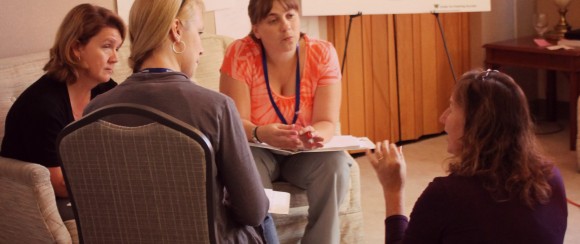History
Fostering Success Michigan (FSM) was established in 2012 at Western Michigan University as a collaboration of campuses, agencies, and professionals who were interested in figuring out the best ways to support students with experience in foster care in college. With generous support from The Kresge Foundation, the Havirmill Foundation, and others, a statewide collective impact initiative was launched to increase postsecondary access and success for students with experience in foster care by building a statewide network of support across college campuses and within local communities.
In 2018, FSM transitioned from Western Michigan University to The New Foster Care, an organization committed to accomplishing change through servicing at-risk families, supporting fostering and adoptive families, and strengthening youth who are transitioning out of foster care with future opportunities. The New Foster Care provided a bridge for FSM to continue programming, while working to identify a permanent home that would ensure long-term sustainability and an opportunity to scale nationally. In 2021, The New Foster Care provided funding for FSM to transition to Educate Tomorrow.
Educate Tomorrow
Fostering Success Michigan is a program of Educate Tomorrow, a national organization focused on postsecondary access and success for youth with experience in foster care and homelessness.
Educate Tomorrow began almost 20 years ago when its founders discovered students from foster care could receive free college tuition in Florida. Eight students at the time were using this little-known tuition exemption. Educate Tomorrow spread the word and prepared and enrolled students for postsecondary success, providing much needed support all along the way.
As the organization grew, it provided financial resources to fund on-campus coaches dedicated to this student population at Miami Dade College and Florida International University. Since the initial investments in 2014, these two institutions have conferred more than 600 degrees to students utilizing the tuition waiver.
As the number of students accessing tuition exemptions grew from tens to hundreds to thousands, Educate Tomorrow was awarded a contract in 2016 by the State of Florida’s Department of Children and Families (DCF) to lead the statewide network, the Positive Pathways Program, that supports over 6,700 students from foster care at all Florida public state colleges and universities.
In addition to Florida and Michigan, Educate Tomorrow is also actively developing networks in Colorado, Arizona, Texas, and Wisconsin.
Our Mission
Fostering Success Michigan will increase access and success in postsecondary education among Michigan's students with experience in foster care through the building of a holistic network that insulates (i.e., strengthens protective factors and reduces risks) the education to career “pipeline” for students from foster care. The Fostering Success Michigan Network participants include: students with experience in foster care, higher education professionals, child welfare professionals, community organizations, supportive adults, philanthropic support, and the business community.
Collective Impact Framework
Fostering Success Michigan is utilizing a Collective Impact Framework to address Michigan's need for large-scale social change in the area of students with experience in foster care and their access and success in higher education and post-college careers. The Collective Impact Framework employs five distinct conditions for social change: Backbone Organization, Common Agenda, Mutually Reinforcing Activities, Shared Measurement, and Continuous Communication.
Backbone Organization
As a collective impact backbone organization, Fostering Success Michigan employs three strategies: Resourcing, Supporting, and Networking. These strategies address the knowledge, skill and social capacity gaps that must be filled to create a sustainable education to career pipeline for students with experience in foster care. Fostering Success Michigan is a hub, supporting Michigan’s network of experts versus being an “expert organization”. Bringing together the combined energy and efforts from partners across the State of Michigan allows Fostering Success Michigan to identify areas where resources are lacking and collaborate with partners to fill these gaps.
Common Agenda
Fostering Success Michigan has aligned with the Michigan College Access Network in support of Governor Gretchen Whitmer's statewide postsecondary attainment goal, which is that 60% of Michigan residents complete a postsecondary certificate or degree by the year 2030. Until the governor's announcement, Michigan was the only state in the Midwest and one of nine in the country that did not have an established postsecondary attainment goal at the state level. FSM is proud to align with the new vision, which will help create more paths for youth with experience in foster care to earn postsecondary certificates and degrees, and address a growing talent shortage in Michigan's workforce.
Mutually Reinforcing Activities
Each partner in the Fostering Success Michigan Network plays a vital role in the education to career pipeline for youth and alumni of foster care. As a partner in the Fostering Success Michigan Collective Impact strategy, participants agree to work collaboratively and share best practices, knowing that the best solution in one community may need adaptation for success in another community, or may not fit at all.
Shared Measurement
A shared measurement strategy is being established through the collaborative efforts of the Fostering Success Michigan Higher Education Consortium (FSM HEC). Fostering Success Michigan collects data on the numbers of students served by and graduating from campus-based support programs in Michigan to monitor progress of success and provide a realistic understanding of how Michigan’s students with experience in foster care move to and through postsecondary education and into professional careers.
Click here to read the Fostering Success Michigan Developmental Evaluation 2012-2015!

Continuous Communication
To ensure that our diverse group of partners maintains an awareness of successes, challenges, priority issues and shared solutions, FSM supports continuous communication through a variety of networking activities. These include FSM Quarterly Newsletters, FSM Podcast Series, FSM YouTube Channel, FSM Student Spotlights, and in-person networking opportunities. “Like” FSM on Facebook and “Follow” @FSMichigan on Twitter for up the minute info about child welfare and higher education.